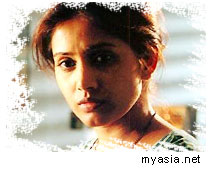Devrai - 2005
Story
Their latest film 'DEVRAI' (Sacred Grove) is undoubtedly amongst their best work and surely the most impressive Marathi film made in the last two years - never mind that people thought a much lesser 'SHWAAS' deserved a National Award. Like 'SHWAAS', this film too is based on a medical theme, but unlike it, has far greater depth and no high-pitched melodrama. Instead, the story of a schizophrenic struggling to come to terms with his illness and the frustration of his helpless sister is narrated with immense sensitivity.Through a series of wonderfully laid-out flashbacks, we meet Shesh (Atul Kulkarni), a mentally disturbed individual who has an emotional outburst at his sister Seena's (Sonali Kulkarni) house in the midst of a party and is subsequently confined to a hospital. As a battery of doctors try to unravel the mysteries of his mind with Seena's help, we learn about how he was always a very short-tempered, reserved boy who is at ease with nature - whether it is the thick forest near his village or the virgin sea shore characteristic to several tiny villages in the Konkan region of Maharashtra - but is unable to deal with people. As he grows older, his frustration piles up higher and his failure to pursue his research on the sacred grove, his inability to come to terms with his attraction for his widowed cousin Kalyani and the games his own mind starts playing with increasing frequency all contribute to his inexplicable bouts of violence and incoherent blabbering.
It becomes impossible for him to separate his imaginary world from the reality around him and the doctors describe this condition as schizophrenia.
The rest of the story is about how Seena, with some help from the kind-hearted senior doctor (Mohan Agashe) and a lady who runs a day-care center for mentally ill people, and in spite of the constant bickering of her insensitive scientist husband Sudesh (Tushar Dalvi), helps her brother come to terms with the disease.
However, at the end of a beautifully developed screenplay comes a shocking resolution, particularly unpalatable from a feminist filmmaker like Bhave. When Shesh shows a remarkable recovery and expresses his desire to go back to the village, his sister approaches Kalyani to accompany him - the same cousin who is never allowed to meet him in hospital, the same woman who had been driven out of the village house because of Shesh's attraction for her; the lonely widow who has built herself a life in Pune after a long struggle and is asked to give it all up because she doesn't have anyone else and Shesh needs her!!
Barring this inconsistency, 'DEVRAI' is almost flawless. Debu Deodhar's masterful camerawork gives us a visual sense of Shesh's surreal world, while Atul Kulkarni's brilliant poetry expresses his emotional discord.
The absolutely true-to-life characters - from Seena and Kalyani to Sudesh and even minor players like Shesh's mother, bring immense credibility to the story.
Above all it is stunning performances from Sonali Kulkarni and more importantly, Atul Kulkarni, which make this film special. Notice Seena's breakdown when Shesh's imaginary world actually starts creating doubts in her mind too. As for Atul, the sheer consistency with which he portrays a complex character like Shesh - his body language, his mannerisms, his voice modulation and the entire personality of a mentally disturbed man - is outstanding.
Most films, which deal with specific issues, tend to get too preachy and therefore uninteresting. 'DEVRAI' is exceptional because it gets the message across and touches a chord deep inside - one hopes this will be the true harbinger of good Marathi cinema in years to come.
Cast & Crew
Atul Kulkarni Sonali Kulkarni Devika Daftardar Tushar Dalvi Amruta Subhash Rajesh More Dr. Mohan Agashe
Director
Sumitra Bhave & Sunil Sukthankar





